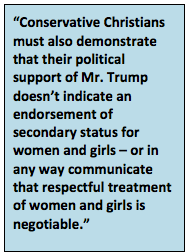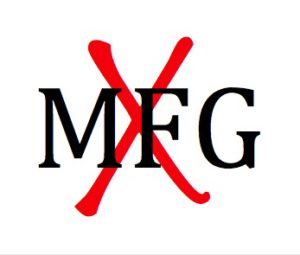 Conservative Washington Post columnist Michael Gerson writes that “religious conservatives have become a corporate sponsor of Trumpism, like Visa at the Olympics” – which is, without doubt, the best line I’ve read post-election.
Conservative Washington Post columnist Michael Gerson writes that “religious conservatives have become a corporate sponsor of Trumpism, like Visa at the Olympics” – which is, without doubt, the best line I’ve read post-election.
Even better, the three points Gerson offers up in his “uninvited sermon” are thoughtful and deserve wide discussion in the evangelical community.
But it’s pretty shocking there wasn’t a fourth point – a sign of a serious blind spot in the roster of conservative priorities and sensibilities.
Let’s turn first to Gerson’s advice, starting with his first point about nativism and immigrants:
First, it is a fact – one of those real facts – that Trump’s brand is associated with nativism, particularly the dehumanization of illegal immigrants (as rapists and murderers) and the otherization of Muslims (as internal and external threats). Evangelicals in the governing coalition need to find a way to demonstrate that this was not the reason they supported Trump – that their hard choice was motivated by other, nobler causes
His second point is about freedom of speech applying to all:
Second, evangelicals must utterly reject the idea that the protections of the First Amendment apply to them but not fully to Muslims.
Finally, Gerson raises a red flag about the danger religions face when they affiliate with a political group:
Third, conservative Christians need to remember that – throughout the cautionary tale of Western history – when religion identified with a political order, it is generally not the political order that suffers most. It is the reputation of the faith.
What’s missing from this provocative, heartfelt troika of advice?
Any mention of Mr. Trump’s sexist language and behavior. Any concern expressed about Trump’s pattern of demeaning and predatory behavior with women.
Who can forget how Trump’s smarminess was so succinctly summarized by Megyn Kelly at the August 2015 Republican debate:
“You’ve called women you don’t like ‘fat pigs,’ ‘dogs,’ ‘slobs’ and ‘disgusting animals.’ …
Who can forget the tapes from Access Hollywood or the Miss Universe pageant?
It’s particularly perplexing that Mr. Gerson’s column was published in the Post two days following the Women’s March on Washington, a time when millions of Americans were raising up concerns about civility, sexism, and equal access and opportunity.
Mr. Gerson’s three-point sermon is a thoughtful homily that deserves consideration for many Sundays to come.
But the sermon needs a postscript: Conservative Christians must also demonstrate that their political support of Mr. Trump doesn’t indicate an endorsement of secondary status for women and girls – or in any way communicate that respectful treatment of women and girls is negotiable.


